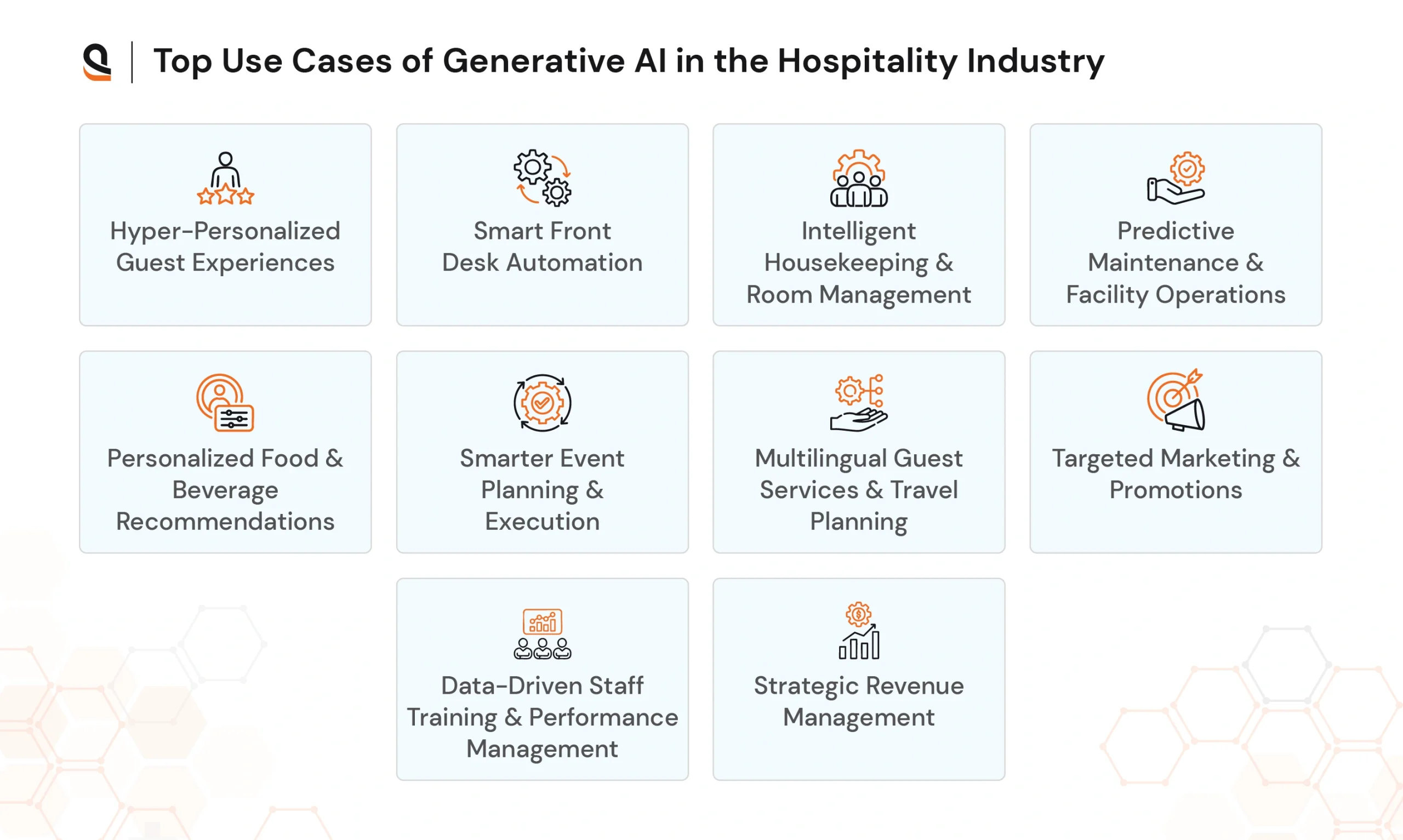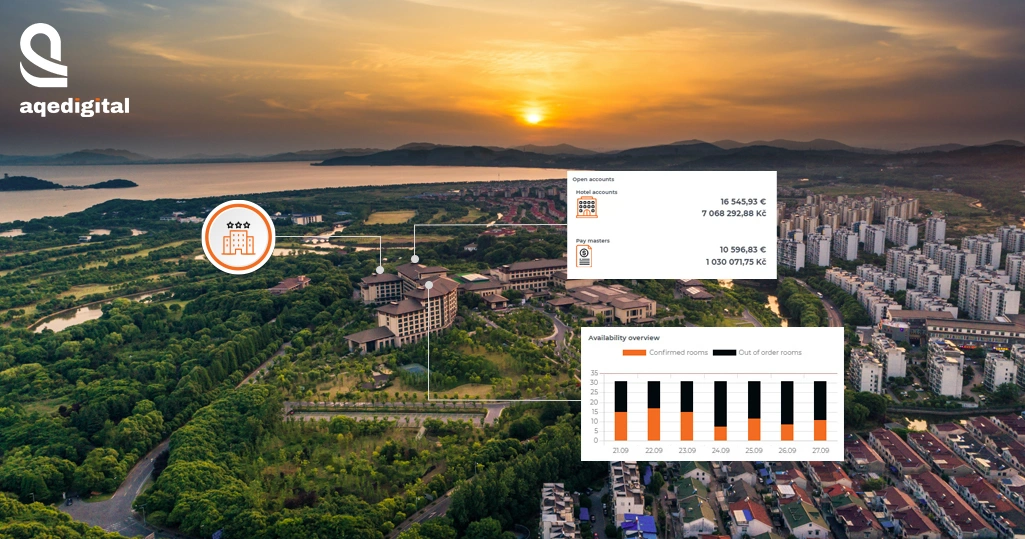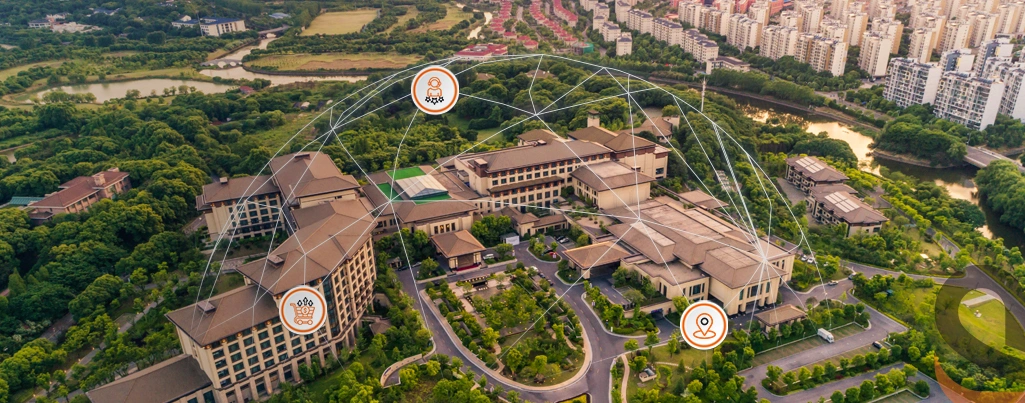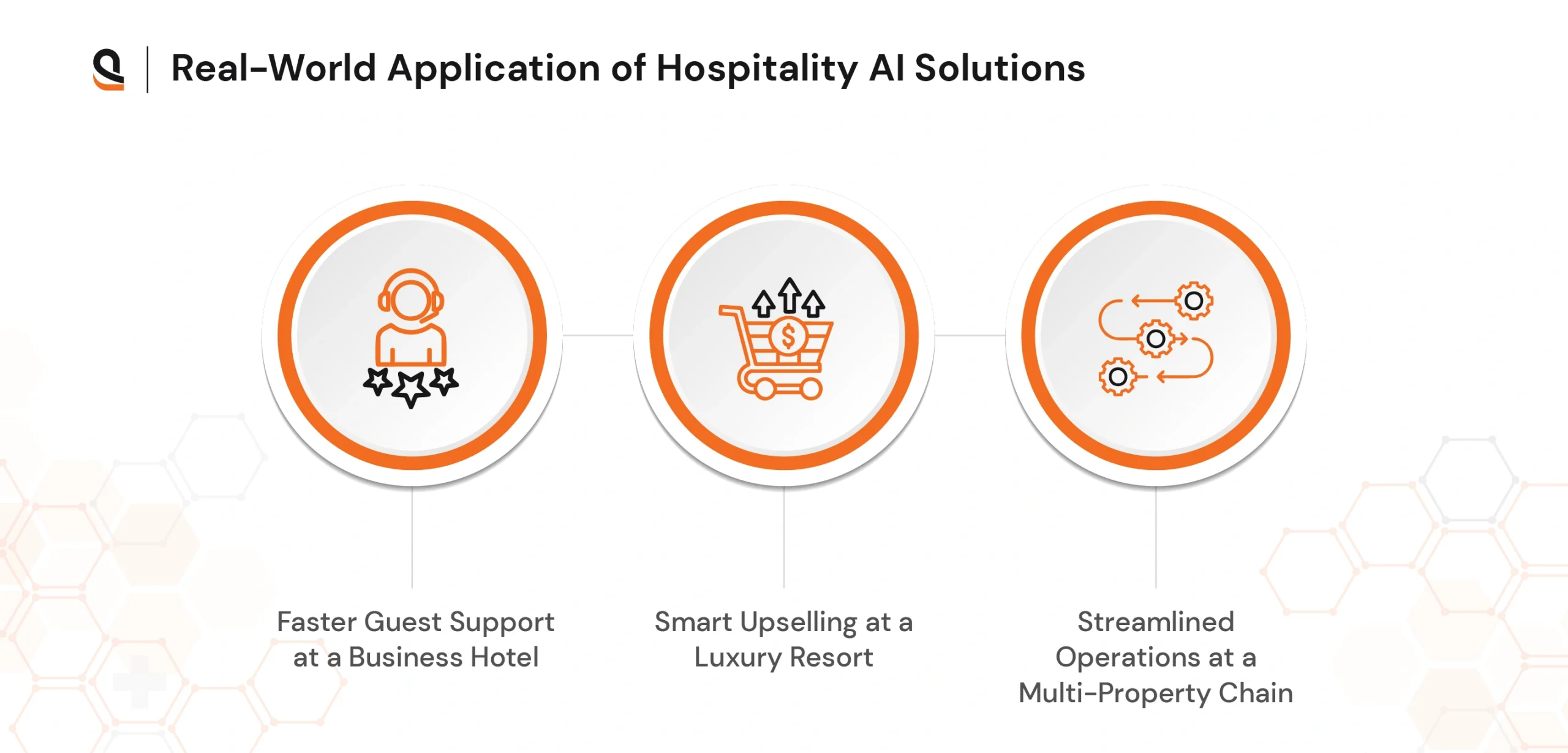Imagine a guest arriving at your hotel and as they walk in, the front desk proactively completes the paperless check-in process, saving your guest’s time. Your hotel app suggests their favorite meal that can be ordered with a single tap. This level of personalized service is no longer futuristic; it’s being powered today by AI in hospitality. Generative AI in hospitality is transforming the way hotels operate.
From optimizing front desk processes to enhancing guest experience and automating internal workflows, hospitality AI solutions are becoming integral to daily operations. This is why the valuation of generative AI within the hospitality industry is growing at a CAGR of 40.2%, expected to reach a valuation of USD 439 billion by 2033.
However, there are challenges to its adoption. As a hotel owner or a CTO of hospitality enterprises, you may need to decide whether to invest in generative AI. Such a decision needs an understanding of key use cases of generative AI in hospitality. This article focuses on what generative AI is, its business impact, the benefits you will get, and the top use cases.
What Is Generative AI and Why Does It Matter In Hospitality?
Generative AI, in simple terms, refers to systems capable of creating new content, text, images, recommendations, and more based on existing data. Unlike traditional automation, generative AI not only processes information but also intelligently produces context-aware outputs.
If integrated and implemented with a proper strategy, it can open up multiple possibilities for the hospitality industry, such as personalized guest communication, appealing content generation, dynamic pricing, and much more.
Key Benefits of Generative AI for Hotels:
- Generates personalized responses and marketing content in real time
- Automates repetitive communication tasks (booking confirmations, FAQs, upsell offers)
- Enhances hospitality IT support with self-improving knowledge systems
- Enables automation in hospitality processes like reporting, concierge tasks, and content creation
- Improves service consistency across digital and in-person touchpoints
Integrating AI in hospitality doesn’t just limit its capabilities to simply automating the tasks; it assists stakeholders in driving meaningful engagement and decision-making at every level. Through intelligent automation, smart recommendations, and data-driven personalization, AI in the hospitality industry is setting new benchmarks for service excellence, operational efficiency, and customer loyalty.
Business Impact: Why Hotels Should Invest in AI Now
Adopting AI for hotels is no longer a futuristic strategy; it’s a current competitive necessity. Hotels that implement AI in hospitality see measurable improvements in guest satisfaction, staff efficiency, and operational performance.
Measurable Benefits:
- Up to 30% reduction in operational costs through automation in hospitality
- 20–25% increase in direct bookings using AI-driven chatbots in the hospitality industry
- 3x improvement in guest engagement through personalized messaging
- 40% reduction in response time for customer queries with AI in the hospitality industry
When used strategically, hospitality AI solutions unlock new levels of profitability without compromising guest experience.
The Rising Demand for AI in Hospitality
Speaking of the current digital landscape, the hospital industry is no longer an exceptional industry that has remained untouched by innovation and digitization.
Apart from luxury, comfort, and excellent infrastructure, guests now demand round-the-clock services, prompt responses, personalized recommendations, seamless check-ins, and flawless service throughout their entire stay, from arrival to checkout.
And this is how and where AI in hospitality becomes essential and beneficial. There is a significant transformation in how hotels manage operations, engage with guests, and make decisions, all after the application of AI in the hospitality industry.
The application of hospitality AI solutions has opened the door for multiple opportunities for hotel business operations, ranging from smart room controls to predictive maintenance, from intelligent upselling to conversational AI.
Most importantly, hospitality AI solutions powered by generative AI are capable of scaling with your operations, providing a tangible ROI quickly and sustainably.
How Generative AI in the Hospitality Industry Improves Guest Experience

1. Hyper-Personalized Guest Experiences
Generative AI can help hoteliers design one-of-a-kind experiences for their guests, leading to increased customer satisfaction and brand loyalty. How? GenAI can deliver and recommend personalized itineraries, room setups, and services by analyzing guest profiles, preferences, behaviours, and records.
- Personalized welcome messages based on guest history
- Tailored activity or dining recommendations
- Customized in-room entertainment and amenities
- Loyalty program rewards are based on individual guest behavior
This level of personalization is only possible with AI in hospitality industry tools that learn and adapt in real time. Tailored hospitality solutions connected with the data platforms and AI algorithms help deliver personalized experiences, enhancing the retention rates and upselling opportunities.
2. Smart Front Desk Automation
With Generative AI, front desk operations can be streamlined to reduce wait times, improve check-in experiences, and enhance multilingual communication. Automating routine interactions improves service efficiency and lets staff focus on higher-value guest interactions.
- Automated check-in and real-time room assignments
- AI-powered multilingual translation for international guests
- Instant responses via chatbots in the hospitality industry
- Predictive guest arrival insights for staff preparedness
These AI-powered front desk upgrades illustrate the powerful benefits of AI for hotel guest services. AI for hotel systems integrates with PMS and CRM tools to automate front desk operations. With AI and ML integration, it reduces check-in and check-out time, facilitates multilingual responses, and enhances overall workflow.
3. Intelligent Housekeeping and Room Management
Housekeeping is a tedious job, and AI can optimize it by analyzing guest schedules, predicting room usage, and automating supply tracking. Such automation and accurate predictions help hoteliers offer cleaner rooms without disturbing guests’ privacy and leisure moments, leading to more efficient operations.
- Smart scheduling of cleaning tasks
- Personalized room setups
- Inventory tracking
- Resource allocation
These improvements are a testament to automation in hospitality, driving operational excellence.
AI in hospitality integrates with operational tools to enable dynamic task scheduling, predictive inventory alerts, and personalized room-prep protocols, ensuring efficiency through end-to-end automation in back-office operations.
4. Predictive Maintenance and Facility Operations
Generative AI can help hotel management to be proactive and experience fewer equipment failures, lower expenses, and a more seamless guest experience by analyzing equipment data, guest feedback, and environmental sensors.
- Real-time monitoring and reporting of maintenance issues
- Predictive maintenance scheduling to avoid downtime
- Automated ticket generation for repairs based on sensor data
- Optimized inventory control for maintenance supplies
Integrating AI in hospitality helps save on long-term facility costs, ensuring smooth operations. Intelligent sensors and predictive analytics integrated with IoT product development services and AI reduce unplanned downtime and maintenance costs, supporting AI use cases in hospitality that prioritize operational resilience.
5. Personalized Food and Beverage Recommendations
Using guest data and inventory insights, AI can recommend menus, manage food waste, and optimize restaurant performance. Dining becomes more personal and efficient for both guests and staff.
- Dynamic menu suggestions based on dietary preferences
- Feedback analysis to improve dishes and service quality
- Inventory-level analysis to reduce waste
- Personalized promotional content for special dining events
Hospitality AI solutions empower F&B teams to deliver memorable meals tailored to every guest. Hospitality AI solutions connect POS data with guest history to deliver intelligent F&B insights, from real-time menu engineering to targeted dining offers, bringing AI directly into culinary operations, leveraging data analytics services.
6. Smarter Event Planning and Execution
Hotels hosting events can use Generative AI to design layouts, automate proposals, and optimize post-event engagement, leading to more impactful events and satisfied attendees.
- Customized event proposals based on guest profiles
- Optimized layouts and scheduling using past data
- Personalized follow-up emails and satisfaction surveys
- Live content adjustments based on attendee interactions
These capabilities reflect the increasing role of AI in hospitality industry event management. Event-focused AI for hotel platforms streamlines planning and guest engagement workflows, from auto-generated layouts to adaptive feedback loops, exemplifying the future of AI in hospitality event management.
7. Multilingual Guest Services and Travel Planning
AI enables international hospitality by offering real-time language support, itinerary creation, and localized recommendations, removing communication barriers and enriching the travel experience.
- Real-time AI-powered language translation
- Custom itinerary creation based on guest interests
- Localized shopping and sightseeing suggestions
- Voice-enabled concierge services for hands-free convenience
This ensures global guest comfort through AI for hotel customer service systems. Multilingual chatbot software in hospitality ensures global accessibility with real-time translations, itinerary curation, and smart concierge features, enabling truly borderless AI-driven guest experiences.
8. Targeted Marketing and Promotions
Generative AI helps marketing teams personalize communication, track campaign performance, and improve ROI. Messages resonate better when they’re tailored to what guests actually want.
- Tailored email campaigns based on previous behavior
- Real-time campaign performance tracking and analysis
- Social media optimization through AI-driven insights
- Guest segmentation for customized promotional offers
These AI-driven marketing practices exemplify how hospitality IT support extends into revenue generation. Data-driven marketing engines in enterprise hospitality AI enable hyper-targeted outreach and automated content generation, aligning with AI use cases in hospitality that maximize campaign ROI.
9. Data-Driven Staff Training and Performance Management
Training and performance reviews can be optimized using AI to track progress, tailor learning content, and offer real-time feedback, improving overall service quality and employee satisfaction.
- Adaptive training modules that evolve with staff performance
- AI-generated performance reviews with actionable insights
- Internal communications support for cross-team coordination
- Predictive scheduling based on occupancy and staffing trends
These tools are shaping the future of AI in hospitality, supporting both guests and internal teams. Intelligent learning systems enhance team productivity and performance reviews, with hospitality IT support tools ensuring workforce readiness for the future of AI in hospitality.
10. Strategic Revenue Management
AI can analyze booking behavior, cancellations, and upsell opportunities to create optimized packages and maximize revenue across different customer segments and seasons.
- Package creation based on guest interests and spending habits
- Overbooking strategies informed by cancellation trends
- Predictive pricing models to increase profitability
- Channel optimization for distribution and exposure
This approach to strategic pricing reflects AI use cases in hospitality that improve business outcomes.
Predictive pricing and inventory intelligence tools within AI in hospitality integrate market data and guest profiles to maximize earnings through intelligent rate and package optimization, embracing the future of AI in hospitality with predictive analytics.
11. Fraud Detection in Bookings and Payments
AI safeguards hotels by monitoring real-time booking patterns and payment activities to detect irregularities and prevent fraudulent transactions before they cause losses.
- Identification of suspicious booking behavior across platforms
- Automated flagging of unusual payment activity
- Machine learning models to reduce chargebacks and fraud risks
- Secure verification systems for guest identity protection
This proactive fraud prevention reflects AI use cases in hospitality that enhance financial security and trust.
Fraud detection tools powered by AI in hospitality integrate data from multiple channels to reduce risks, safeguard transactions, and build confidence in digital booking systems.
12. Sustainability and Energy Optimization with AI
AI enables hotels to adopt sustainable practices by monitoring resource consumption and automating energy efficiency, reducing both costs and environmental impact.
- Smart energy management for heating, cooling, and lighting
- Predictive maintenance to avoid energy waste
- Automated optimization of water usage across facilities
- AI-driven insights for eco-friendly operations and compliance
This approach to sustainability reflects AI use cases in hospitality that balance profitability with responsibility. Energy optimization systems within AI in hospitality leverage real-time data to cut carbon footprints, lower utility bills, and support greener guest experiences.
13. AI-Powered Dynamic Pricing & Distribution
AI helps hotels maximize occupancy and revenue by dynamically adjusting prices and optimizing distribution channels based on real-time market data and guest demand.
- Automated room rate adjustments using demand signals
- Smart bundling of packages for specific guest segments
- Distribution channel performance analysis and optimization
- Forecasting demand to prevent underpricing or overbooking
This dynamic pricing approach reflects AI use cases in hospitality that drive competitive advantage and revenue growth.
AI-powered dynamic pricing and channel management tools within AI in hospitality integrate predictive analytics to deliver smarter rate decisions, market alignment, and enhanced exposure, leveraging Artificial Intelligence and machine learning development capabilities.
14. AI-Driven Guest Feedback & Sentiment Analysis
AI analyzes guest reviews, surveys, and social media feedback to uncover sentiment patterns and identify areas for service improvement.
- Real-time monitoring of online reviews and ratings
- Sentiment analysis to track guest satisfaction trends
- Automated response suggestions for guest concerns
- Insights to refine service standards and training programs
This feedback-driven approach reflects AI use cases in hospitality that prioritize continuous improvement and guest-centricity.
AI-powered feedback and sentiment analysis tools within AI in hospitality transform unstructured data into actionable insights, helping hotels enhance reputation and guest experiences.
How Hospitality AI Solutions Deliver Real-World Impact
 Faster Guest Support at a Business Hotel
Faster Guest Support at a Business Hotel
A mid-sized business hotel implemented chatbots in the hospitality industry to manage bookings, provide real-time flight updates, and handle late check-ins. Result? Guest wait times were cut in half, and front desk staff were able to focus on more complex tasks.
Smart Upselling at a Luxury Resort
Using generative AI in hospitality, a resort created personalized upsell offers based on guest profiles. Spa upgrades, dining experiences, and local excursions were offered dynamically through chat. The hotel saw a 35% increase in upsell revenue.
Streamlined Operations at a Multi-Property Chain
A large hotel chain used automation in hospitality to automate scheduling, cleaning logs, and room readiness updates across properties. This resulted in more consistent service, fewer missed tasks, and better use of staff hours.
These AI use cases in hospitality prove that the technology is not just scalable—it’s immediately impactful.
The Future Of AI In Hospitality
Looking ahead, the future of AI in hospitality is centered around intelligent systems that can anticipate guest needs and automate entire service flows. Innovations on the horizon include:
- Voice-enabled concierge with emotion recognition
- AI-curated dining menus based on dietary preferences and booking trends
- Room configurations that adapt based on guest type (business, family, leisure)
- Augmented reality tours powered by AI-generated content
The future of AI in hospitality is about moving from reactive service to proactive, predictive, and deeply personalized experiences. Hotels that start now with foundational hospitality AI solutions will be positioned to take full advantage of these breakthroughs.
How AQe Digital Can Help the Hotel Industry With AI Solutions?
At AQe Digital, we specialize in helping hospitality businesses unlock the full potential of AI – whether it’s generative AI for hyper-personalized guest experiences, predictive analytics for dynamic pricing, or intelligent automation that streamlines front desk, housekeeping, and facility operations.
We understand the challenges hoteliers face today, including rising guest expectations, operational inefficiencies, fraud prevention, sustainability goals, and the need for data-driven decision-making.
Partnering with AQe Digital means more than just deploying technology—it’s about building a future-ready hospitality ecosystem. From consultation and custom software development to seamless implementation and IT support, we deliver end-to-end services that align with your property’s goals.
With our expertise in generative AI, dynamic pricing, predictive maintenance, guest sentiment analysis, and sustainable operations, we empower your hotel to stay competitive, profitable, and innovative. Contact us and let AQe Digital be your trusted partner in shaping the future of hospitality with AI-driven excellence.
FAQs
Generative AI in hospitality refers to advanced AI systems that create personalized content, recommendations, and automated responses for hotels and guests. Unlike traditional automation, generative AI doesn’t just process data—it produces intelligent, context-aware outputs such as personalized itineraries, multilingual chat responses, and targeted marketing campaigns. This allows hoteliers to deliver hyper-personalized guest experiences and optimize daily operations.
Hotels can benefit from AI in hospitality in multiple ways, including:
- Improved guest experience through hyper-personalized recommendations.
- Operational efficiency with automation in front desk, housekeeping, and facility management.
- Revenue growth via AI-powered dynamic pricing and upselling.
Data-driven decision-making with predictive analytics and sentiment analysis.
By leveraging hospitality AI solutions, hoteliers can reduce costs by up to 30% while increasing guest engagement and loyalty.
The cost of adopting generative AI in hospitality depends on the scale of implementation, but it often delivers a quick return on investment. For example, hotels using AI chatbots see a 20–25% boost in direct bookings, while automation in hospitality reduces labor and operational costs significantly. Scalable hospitality AI solutions allow properties of all sizes to adopt AI gradually, making it a cost-effective investment rather than a high-risk expense.
Some of the most impactful AI use cases in hospitality include:
- Personalized guest communication and loyalty rewards.
- Smart front desk automation with multilingual support.
- Predictive maintenance and facility monitoring.
- Dynamic pricing and revenue optimization.
- AI-driven sentiment analysis for guest feedback.
These applications showcase how AI in hospitality is transforming both guest-facing services and back-office operations.
The future of AI in hospitality is moving toward proactive, predictive, and fully automated services. Hotels will use voice-enabled concierge systems, AI-curated menus, adaptive room configurations, and augmented reality tours powered by generative AI. As hospitality AI solutions continue to advance, hotels that invest now will be better positioned to deliver seamless, personalized, and sustainable guest experiences in the years ahead.


 Faster Guest Support at a Business Hotel
Faster Guest Support at a Business Hotel